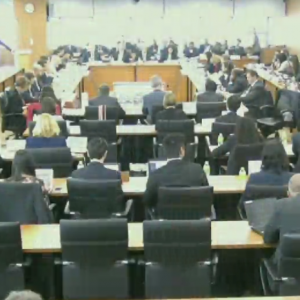Here Are The Eight New Projects The Green Climate Fund Is Supporting
The Green Climate Fund (GCF) on Thursday agreed to support eight projects after its first board meeting of 2017. The projects are valued at $755 million, and most are focused on hydropower and renewable energy, with one – in Tanzania – focused on sustainable land management.

7 April 2017 | Here is brief summary of the eight projects approved Thursday by the GCF board, with links to deeper material. The projects were approved during the 16th meeting of the board at GCF Headquarters in Songdo, Republic of Korea.
The Fund’s portfolio now consists of 43 projects and programmes amounting to $2.2 billion in GCF funding for a total value of $7.3 billion, with co-financing included.
Video recordings of the GCF Board meetings are available on the Fund’s website.
The 17th meeting of the GCF Board will be held from 4 to 6 July of this year, with the 18th meeting taking place before year-end.
Global Energy Efficiency and Renewable Energy Fund 2.0
Amount: $265 million
Location: Global
Partner: European Investment Bank (EIB)
Officially dubbed “GEEREF NeXt”, this is the successor to the Global Energy Efficiency and Renewable Energy Fund GEEREF, which is a fund-of-funds that “leverages public sector funds to catalyse private sector investment into clean energy projects”, according to its web site.
Projects are across five regions in Africa; Latin America and the Caribbean; Middle East and North Africa; Non-European Union Eastern Europe / Central Asia; and the Pacific.
Egypt Renewable Feed-In-Tariff Framework
Amount: $154.7
Location: Egypt
Partner: European Bank for Reconstruction and Development (EBRD);
The project will finance the construction and operation of multiple renewable energy projects, primarily solar photovoltaic plants but possibly wind as well, under the feed-in-tariff program.
Scaling up Hydropower Sector for Climate Resilience
Amount: $50 million for the
Location: Tajikistan
Partner: European Bank for Reconstruction and Development (EBRD);
The project will finance the rehabilitation and modernization program at the Qairokkum hydro power plant, the only power generation facility in the Sugd region of Northern Tajikistan..
Simiyu Climate Resilience Project
Amount: $102.7 million
Location: Tanzania
Partner: KfW Development Bank
The project supports the Tanzanian government’s efforts to promote sustainable water management and farming in the Simiyu Region. Simiyu is designed to provide a template for the rest of the country.
Kaddoussa Hydro-Agricultural Development Project
Amount: EUR 20 million
Location: Morocco
Partner: Agence Française de Développement (AfD);
The project is part of the Green Morocco Plan and aims to help farmers downstream from an existing dam develop better irrigation practices and more effectively manage their groundwater resources.
Saïss Water Conservation Project
Amount: $31.97
Location: Morocco
Partner: European Bank for Reconstruction and Development (EBRD);
The project aims to replace water abstraction from the local aquifer and water resources of the Saiss plain, which is currently overexploited.
Tina River Hydropower Development Project
Amount: $86 million
Location: the Solomon Islands
Partners: World Bank, Others
This project aims to build a new hydropower facility on the Tina River.
Ground Water Recharge and Solar Micro Irrigation
Amount: $34.35 million
Location: Odisha, India
Partner: National Bank for Agriculture and Rural Development (NABARD).
The project aims to recharge groundwater storage and develop solar micro irrigation to ensure food security and enhance resilience in vulnerable tribal areas of Odisha.
Please see our Reprint Guidelines for details on republishing our articles.

